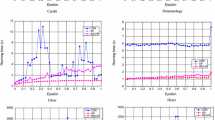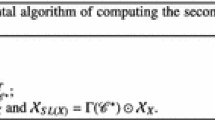Abstract
Knowledge reduction is a key issue in data mining. In order to simplify the covering approximation space and mining rules from it, Zhu proposed a reduction of covering approximation space which does not rely on any prior given concept or decision. Unfortunately, it could only reduce absolutely redundant knowledge. To reduce relatively redundant knowledge with respect to a given concept or decision, the problem of relative reduction is studied in this paper. The condition in which an element of a covering is relatively reducible is discussed. By deleting all relatively reducible elements of a covering approximation space, one can get the relative reduction of the original covering approximation space. Moreover, one can find that the covering lower and upper approximations in the reduced space are the same as in the original covering space. That is to say, it does not decrease the classification ability of a covering approximation space to reduce the relatively reducible elements in it. In addition, combining absolute reduction and relative reduction, an algorithm for knowledge reduction of covering approximation space is developed. It can reduce not only absolutely redundant knowledge, but also relatively redundant knowledge. It is significant for the following-up steps of data mining.
This research is supported by the National Natural Science Foundation of P.R. China (No.60573068, No.60773113), Natural Science Foundation of Chongqing (No.2005BA2003, No.2008BA2017), Natural Science Foundation of Chongqing University of Posts and Telecommunications (A2006-56), and Science & Technology Research Program of the Municipal Education Committee of Chongqing (No.KJ060517).
Preview
Unable to display preview. Download preview PDF.
Similar content being viewed by others
References
Bonikowski, Z., Bryniarski, E., Wybraniec, U.: Extensions and Intentions in the Rough Set Theory. Information Science 107, 149–167 (1998)
Hu, J., Wang, G.Y., Zhang, Q.H.: Uncertainty Measure of Covering Generated Rough Set. In: 2006 IEEE/WIC/ACM International Conference on Web Intelligence and Intelligent Agent Technology (WI-IAT 2006 Workshops) (WI-IATW 2006), pp. 498–504 (2006)
Huang, B., He, X., Zhou, X.Z.: Rough Entropy Based on Generalized Rough Sets Covering Reduction. Journal of Software 15(2), 215–220 (2004) (in Chinese)
Huang, H., Wang, G.Y., Wu, Y.: An approach for Incomplete Information Systems. In: Dasarathy, B.V. (ed.) Data Mining and Knowledge Discovery: Theory, Tools, and Technology VI. Proceedings of SPIE, vol. 5433, pp. 114–121 (2004)
Kryszkiewicz, M.: Rough Set Approach to Incomplete Information System. Information Sciences 112, 39–49 (1998)
Kryszkiewicz, M.: Rule in Incomplete Information Systems. Information Sciences 113, 271–292 (1999)
Li, T.J.: Rough Approximation Operators in Covering Approximation Spaces. In: Greco, S., Hata, Y., Hirano, S., Inuiguchi, M., Miyamoto, S., Nguyen, H.S., Słowiński, R. (eds.) RSCTC 2006. LNCS, vol. 4259, pp. 174–182. Springer, Heidelberg (2006)
Mordeson, J.N.: Rough Set Theory Applied to (fuzzy) Ideal Theory. Fuzzy Sets and Systems 121, 315–324 (2001)
Pal, S., Mitra, P.: Case generation using rough sets with fuzzy representation. IEEE Trans. On Knowledge and Data Engineering 16(3), 292–300 (2004)
Pawlak, Z.: Rough Sets. Computer and Information Science 11, 341–356 (1982)
Slowinski, R., Vanderpooten, D.: A Generalized Definition of Rough Approximations Based on Similarity. IEEE Tansactions on Knowledge and Data Engineering 12(2), 331–336 (2000)
Tsang, E.C.C., Chen, D., Lee, J.W.T., Yeung, D.S.: On The Upper Approximations of Covering Generalized Rough Sets. In: Proceedings of The Third International Conference on Machine Learning and Cybernetics, Shanghai, pp. 4200–4203 (2004)
Wang, G.Y.: Extension of Rough Set under Incomplete Information Systems. In: IEEE International Conference on Fuzzy Systems (FUZZ-IEEE), pp. 1098–1103 (2002)
Yang, Y., Wang, G.Y., Chen, P.J., Zhou, J., He, K.: Feature Selection in Audiovisual Emotion Recognition Based on Rough Set Theory. In: Peters, J.F., Skowron, A., Marek, V.W., Orłowska, E., Słowiński, R., Ziarko, W.P. (eds.) Transactions on Rough Sets VII. LNCS, vol. 4400, pp. 283–294. Springer, Heidelberg (2007)
Yuan, Z., Wu, Y., Wang, G.Y., Li, J.B.: Motion-Information-Based Video Retrieval System Using Rough Pre-classification. In: Peters, J.F., Skowron, A. (eds.) Transactions on Rough Sets V. LNCS, vol. 4100, pp. 306–333. Springer, Heidelberg (2006)
Zadeh, L.A.: Fuzzy Sets. Inform. Control 8, 338–353 (1965)
Zakowski, W.: Approximation in The Space (U, Π). Demonstratio Mathematica 16, 761–769 (1983)
Zhong, N., Yao, Y., Ohshima, M.: Peculiarity Oriented Multidatabase Mining. IEEE Trans. Knowledge and Data Eng. 15(4), 952–960 (2003)
Zhu, F.: On Covering Generalized Rough Sets, MS thesis, The University of Arizona, Tucson, Arizona, USA (2002)
Zhu, W., Wang, F.Y.: Reduction and Axiomization of Coving Generalized Rough Sets. Information Science 152, 217–230 (2003)
Zhu, W.: Topological Approaches to Covering Rough Sets. Information sciences 177, 1499–1508 (2007)
Zhu, W., Wang, F.Y.: On Three Types of Covering-based Rough Sets. IEEE transactions on knowledge and data engineering 19(8), 1131–1144 (2007)
Zhu, W., Wang, F.Y.: Covering Based Granular Computing for Conflict Analysis. In: Mehrotra, S., Zeng, D.D., Chen, H., Thuraisingham, B., Wang, F.-Y. (eds.) ISI 2006. LNCS, vol. 3975, pp. 566–571. Springer, Heidelberg (2006)
Zhu, W., Wang, F.Y.: A new type of covering rough sets. In: IEEE IS 2006, 4-6 September 2006, pp. 444–449 (2006)
Author information
Authors and Affiliations
Editor information
Editors and Affiliations
Rights and permissions
Copyright information
© 2009 Springer-Verlag Berlin Heidelberg
About this chapter
Cite this chapter
Hu, J., Wang, G. (2009). Knowledge Reduction of Covering Approximation Space. In: Gavrilova, M.L., Tan, C.J.K., Wang, Y., Chan, K.C.C. (eds) Transactions on Computational Science V. Lecture Notes in Computer Science, vol 5540. Springer, Berlin, Heidelberg. https://doi.org/10.1007/978-3-642-02097-1_4
Download citation
DOI: https://doi.org/10.1007/978-3-642-02097-1_4
Publisher Name: Springer, Berlin, Heidelberg
Print ISBN: 978-3-642-02096-4
Online ISBN: 978-3-642-02097-1
eBook Packages: Computer ScienceComputer Science (R0)




